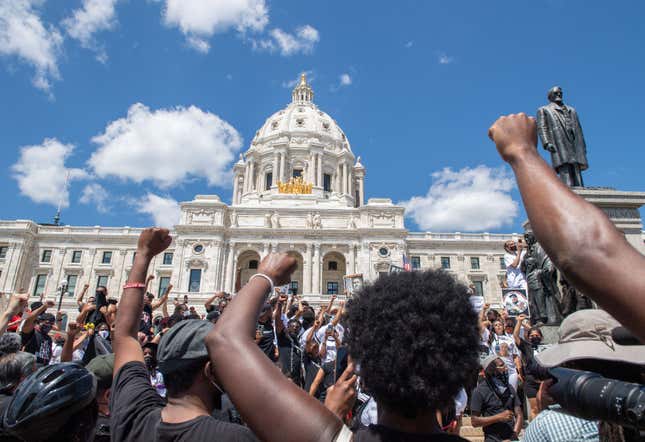
It unfortunately took a global pandemic and the deaths of George Floyd and Breonna Taylor for the nation to realize that we are long past due for significant policing reforms. Due to the fact we currently have a racist-ass president, it’s mainly been on the individual states to implement these reforms. In Minnesota, where Floyd was killed by Minneapolis police in May, a group of state lawmakers passed a series of reform legislations overnight.
According to CBS News, the bill consists of 15 provisions that include a ban on chokeholds and “warrior style” training as well as a requirement for officers to step in if they witness another officer engaging in misconduct. The legislation was passed through both the Democratic-controlled state House of Representatives and the Republican-controlled state Senate during a special session after months of negotiations between the parties. Democratic Rep. Rena Moran called the reforms “urgent,” and has said they are “a major step forward toward re-imagining our vision for public safety in Minnesota.” Moran is the chair of the People of Color and Indigenous Caucus, which authored the bill.
From CBS News:
The bills mandate additional training for officers on crisis intervention, autism and cultural bias, incentives for officers to live in the communities they serve and accountability measures in the police arbitration process. They also require data collection on police use-of-force incidents and create a state body to investigate the cases.
The Minneapolis Police Department has already implemented some of the reform measures, including a ban on chokeholds and neck restraints and a “duty to intervene” policy, ahead of a broader state civil rights investigation triggered by Floyd’s death. The city had banned “warrior-style” training, which teaches officers to view every encounter as potentially dangerous, prior to Floyd’s death.
“Minnesotans expect and deserve action on this issue. Today, we are taking a first step to bring accountability to law enforcement and ensure our communities are safe for all of us,” State Rep. Ryan Winkler, House Majority leader, said in a statement. Sen. Paul Gazelka, the Senate majority leader, has said that more reforms will be introduced over the course of the upcoming legislative session. “These [efforts] need to be vetted in a hearing in a regular session where we can have a lot more voices,” Gazelka told WCCO. “That was something we all wanted, but we sensed the urgency of doing something now.”
State Sen. Jeff Hayden, a Democrat and assistant Senate minority leader, was more tempered in his praise. He believes the legislation “sets the groundwork” for further reforms but felt that it’s lacking key measures to hold bad cops accountable. “This conversation cannot and will not end with the passage of this bill, because there’s a lot of work that will be required to protect Black lives,” Hayden told WCCO.
Minneapolis Mayor Jacob Frey also felt the bill didn’t go far enough in holding officers accountable for misconduct. “The absence of significant arbitration reform in last night’s agreement represents a missed opportunity to strengthen accountability in departments across our state. At the local level, change-oriented leaders like Chief Arradondo will continue to see their ability to effect a culture shift limited without changes to arbitrators’ authority to overturn disciplinary decision for egregious misconduct. People build culture, and we need the tools to more effectively address individual officer behavior,” Frey said.
The bill has been passed to Minnesota Gov. Tim Walz, who intends to sign it into law. “After decades of advocacy by communities of color and Indigenous communities, the bipartisan passage of these measures is a critical step toward justice,” Walz said. “This is only the beginning. The work does not end today.”

